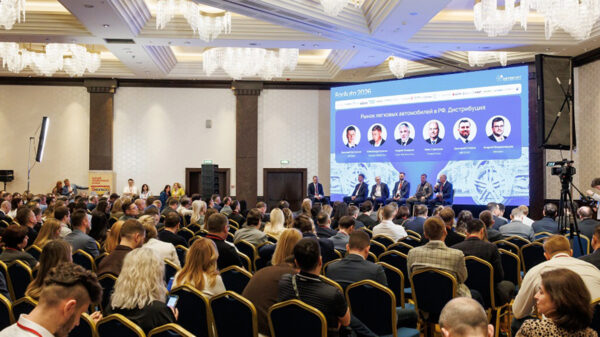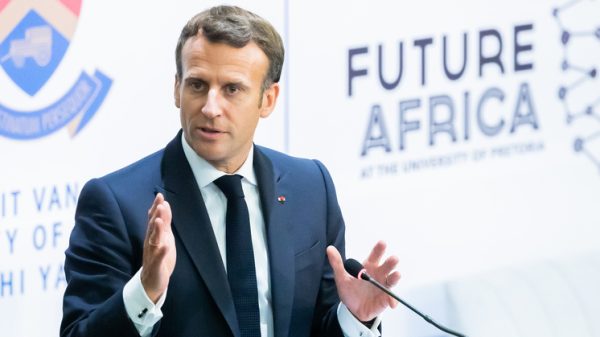 Macron's calls to scrap green rules have sent shockwaves across the EU. Photo: STEPHANE MAHE/POOL/AFP via Getty Images
Macron's calls to scrap green rules have sent shockwaves across the EU. Photo: STEPHANE MAHE/POOL/AFP via Getty Images
Emmanuel Macron stepped forward, wearing a hard hat, to join the workers at the Dunkirk aluminum smelter.
The French president was there to trumpet the recent ProLogium decision , a Taiwanese car manufacturer. battery manufacturer to open its first overseas plant in the northern city with a €5.2bn (£4.5bn) investment.
But he also had another message for his audience: further investment in the factory is at risk if France and the EU halt the flow of environmental laws and regulations emanating from Brussels.
He argued that Europe has already done more than countries such as America and China, and further changes in standards will put it at a competitive disadvantage.
«I prefer factories that respect our European standards, which are the best, over those that still want to add standards and always more, but no factories,» he told this month's crowd.
Macron was highlighting a speech he gave the day before at the Elysee Palace. Outlining his green industry strategy, the French President called for a “European regulatory pause”, adding: “We have already adopted many rules at the European level, more than our neighbors… Now we must comply, not make new changes to the rules. , because otherwise we will lose all the players.
Economy Minister Bruno Le Maire later backed up his boss, telling French television: “There are rules, they are the strictest on the planet. . Instead of constantly wanting to reinforce them, you have to apply them.”
Shifts across the water raise serious questions for the UK about whether weakening the EU green transition could put British business at a disadvantage. Can a country enforce some of the strictest environmental regulations in the world while protecting the competitiveness of its industrial base?
And as Europe pauses its move towards zero emissions, is Britain in danger of becoming even more isolated than ever?
EU Shockwaves
The comments reflect growing concern on the centre-right that Europe's increasingly stringent environmental regulations are making the continent less attractive to investors, who can head to the US or China and receive much larger subsidies while facing much lesser requirements.
These fears have intensified in Germany, where a €12bn takeover of heat pump and air conditioner maker Viessmann by US rival Carrier Group has raised fears of deindustrialization.
In France, meanwhile, Macron and Marine Le Pen, his archrival in the presidential the 2017 and 2022 elections, have repeatedly argued over the closure of factories in the country's northern rust belt, including the endangered Whirlpool clothes dryer factory in Amiens. caused outrage.
“Now Macron is giving the same speech, word for word, as the European right and far right who want to derail the implementation of the rest of the European climate package,” said Insumize Manon Aubry, French MEP and former spokesperson for Oxfam. who is co-chairman of the La France Insoumise party.
David Korman, a French MEP and national secretary of the centre-left Ecology of Europe party, likened the comments to “stopping building a house before the roof is finished.”
“We can’t live in a house without a roof” he added. “When [Macron] sends a message like this to Europe, he sends a signal that we can stop in the middle of the road.”
Green charity Friends of the Earth also called the comments “irresponsible” and “a serious admission of failure.”< /p>
However, Macron's comments sent shockwaves through the wider European establishment. , echoing back to Brussels, where Ursula von der Leyen, President of the European Commission, was quick to acknowledge that it is “important to think about the absorption capacity” of new climate regulations in the EU.
Both Berlaymont and the Elysee Palace have clashed in recent months with large-scale protests due to environmental issues. Parts of Brussels and Paris were brought to a halt as farmers driving thousands of tractors took to the streets to protest new environmental standards.
 'Move your ass Macron', reads a sign on one of the protest tractors. Photo: MOHAMMED BADRA/EPA-EFE/Shutterstock
'Move your ass Macron', reads a sign on one of the protest tractors. Photo: MOHAMMED BADRA/EPA-EFE/Shutterstock
Opposition is also growing in the European Parliament, led by the centre-right European People's Party (EPP), the largest party in the chamber, which includes Germany's Christian Democrats and bills itself as a consumer advocate. and the agricultural industry ahead of next year's elections.
This forced von der Leyen to partly back down, and the Commission is now reportedly set to delay key parts of the EU's so-called Green Deal in an attempt to appease critics.
Meanwhile, EU elites have been watching developments with growing nervousness in the Netherlands. There, the rebellion of farmers against the net zero policy is changing the political landscape.
Under pressure from the right
Macron's opposition to environmental regulations stands in stark contrast to his past statements on climate change, with the French president previously ridiculing Donald Trump for pulling out of the Paris Climate Agreement.
Many of his rivals see his latest statements as political maneuvering aimed at something to appease the people in the northern, historically industrial regions of France. There, as in the north of England, there is a sense that the former factory towns have lost out to globalization.
These are the areas called by the geographer Christophe Guillui «peripheral France», where unemployment is high and households exist. at far lower wages than their metropolitan counterparts.
And over the past five years, they have become increasingly vocal, rising to yellow vest protests against everything from rising fuel prices to lowering speed limits across the country, filling the streets and banging pots and pans in anger.
This idea was echoed by Le Pen in her showdown with Macron, helping her National Rally party win millions of votes in frustrated rural areas.
 During Macron's visit to the Dunkirk plant, he called for a pause in green laws coming from Brussels. Photo: Pascal Rossignol/Pool Photo via AP. gasoline, dismantle wind turbines and accelerate the construction of nuclear power plants so that in the future France can generate 80% of its electricity from nuclear energy.
During Macron's visit to the Dunkirk plant, he called for a pause in green laws coming from Brussels. Photo: Pascal Rossignol/Pool Photo via AP. gasoline, dismantle wind turbines and accelerate the construction of nuclear power plants so that in the future France can generate 80% of its electricity from nuclear energy.
She also criticized the EU green deal, saying it was too prescriptive and that France should be allowed to reach its zero goals «how it chooses».
Since his election victory last year, Macron has redoubled his efforts to «reindustrialize» those parts of France that his critics accuse of ignoring. A wave of announcements that companies would open battery factories in Dunkirk and near Lance helped, and on Monday the president even managed to convince Tesla boss Elon Musk to commit to investing in the future.
Abandoning his earlier stance on nuclear power, which he at one stage wanted to phase out, Macron has now also committed to a new generation of reactors, which ministers hope will create 100,000 new jobs. Crazy Brussels
However, his government is still facing a flurry of internal criticism over what opponents say is a never-ending tide of regulation hitting hard on farmers and industry.
The EPP, which calls for a moratorium on new EU environmental laws, claims that ordinary consumers are being asked to pay the bill for fighting climate change by elites with little understanding of their impact on the real world.
“We need to suspend these rules for the simple reason that the people who have been hit the hardest — ordinary consumers, building owners, farmers, fishermen, companies, industries — have not had time to absorb them. Pedro López de Pablo, spokesman for the EPP parliamentary group, says.
— They have all the economic challenges they need to face right now, they can't handle everything at the same time, so it's a matter of meaning and logic.
He says the EPP has been accused of climate change denial «and I don't know what else» by political rivals, despite its commitment to zero targets by 2050. The party is simply opposing what it sees as «crazy» legislation coming out of Brussels, he said.
«We need to listen to consumers and we need to listen to companies.» he adds.
“You can advise people to recycle their garbage, but if you make it mandatory and there is resistance, then people will just take their garbage and throw it away as soon as they can – we need people to be on board to follow the rules.”
Significantly, the EPP says it agrees with Macron that a flood of environmental and environmental regulations threaten the competitiveness of European industry.
British carmakers «betrayed»
Europe and the UK are trying to decide how to respond to both the expected flood of cars from the heavily subsidized Chinese electric vehicle industry to US President Joe Biden's $430 billion Inflation Reduction Act, which showers green companies with tax breaks and other measures. encouragement.
Particularly attractive is the Inflation Reduction Act proposal of $14,000 in consumer rebates for families on the purchase of heat pumps and a $7,500 tax credit on electric vehicles made in North America. The gifts are so big that many European companies have publicly said they are considering moving to take advantage, including Oxfordshire-based battery maker AMTE Power.
Meanwhile, British dealers are welcoming a slew of new Chinese car brands that experts say are poised to take on Western rivals, prompting companies like Tesla and Ford to cut prices.
Brands like BYD and Ora can offer lower prices for a variety of reasons, not least because electricity and labor are cheaper in their home country.
 The Geely Zeekr X electric car could be half the price of the cheapest Tesla model when it comes to Europe. Credit: REUTERS/Zoey Zhang The plan aims to improve Europe's competitiveness by loosening state aid rules, simplifying regulation, expanding access to finance and training more workers, among other things.
The Geely Zeekr X electric car could be half the price of the cheapest Tesla model when it comes to Europe. Credit: REUTERS/Zoey Zhang The plan aims to improve Europe's competitiveness by loosening state aid rules, simplifying regulation, expanding access to finance and training more workers, among other things.
In the UK, however, Jeremy Hunt, chancellor, and Kemi Badenoch, business secretary, are still working on a response that could be released next month and be accompanied by new money, according to the Times.
In light of all this, Jim Sucker, President of the Automotive Institute and Professor of Retail Management at Loughborough University, argues that the UK's 2030 target of phasing out petrol and diesel cars is five years ahead of schedule. than even the EU — now looks like a death sentence for the domestic auto industry.
Along with cumbersome post-Brexit «rules of origin» requirements that dictate what percentage of parts must be sourced from the UK or the EU, and Vauxhall accuses them of putting their UK factories at risk, Saker says this will put the UK in dangerous position. disadvantage.
The production of electric vehicles will revolve around the production of batteries, most of which are still made in Asia. There is only one battery gigafactory in the UK in Sunderland, and experts say time is running out to develop at least four more that are needed to save the domestic auto industry. Without them, factories connected to the rest of the supply chain will go overseas.
“The only people who will really be on top by 2030 will be the Chinese,” adds Sacker. «BYD and the rest of the Chinese manufacturers have EVs ready and affordable and will use the UK as a dumping ground.» Chinese economy.
«The UK government is betraying the domestic auto industry.»
Backlash
There are already signs that the backlash against green regulation is gaining momentum.
In March, the EEC successfully pushed through an amendment to the EU directive aimed at phasing out gas-fired boilers by 2040. boilers can continue to be installed if they use renewable fuels such as biofuels or hydrogen.
In the same month, the EU was also forced to make concessions on automotive industry standards following the latest demands from Germany and Italy.
p>  Germany has been lobbying for months to exclude e-fuel from an impending ban. Photo: REUTERS/Matthias Rietschel
Germany has been lobbying for months to exclude e-fuel from an impending ban. Photo: REUTERS/Matthias Rietschel
The proposals, a key element of the Green Deal, will prevent the sale of new cars from 2035 that are not «zero emissions». – which is tantamount to a de facto ban on petrol and diesel models.
But when the ministers were ready to sign it, Germany demanded an exemption for vehicles running on so-called e-fuel.
The move follows a split in Chancellor Olaf Scholz's coalition government when his right-wing Free Democratic Party partners demanded a loosening of the rules.
“It is contradictory when the EU Commission requires high climate protection goals on the one hand, but on the other hand makes it difficult to achieve these goals through overly ambitious regulation,” Volker Wissing, FDP transport spokesman. the minister, said in March.
0203 electric vehicles
This follows intense lobbying by some automakers who are looking at e-fuels made from carbon dioxide, oxygen and hydrogen as a way to extend the life of vehicles with internal combustion engines.
Synthetic blends are technically carbon neutral because CO2 tailpipe emissions are later mitigated as pollutants are sucked in from the atmosphere to produce more fuel.
Some companies exploring the technology include Porsche, which opened a pilot plant in Chile in December.
Because Macron also fired at the nose, there was movement in the Berlaymont building.
Despite the Élysée's insistence that France is not calling for the abandonment of any previously agreed rules, the president's comments have been interpreted as a warning that Brussels should at least ease up on the acceleration.
On Wednesday, the Politico website reported that the von der Leyen Commission was ready to delay four key pieces of legislation related to the EU Green Deal.
These include laws relating to «soil health», genetically modified plants, food waste and seeds, all of which strike at the proposals at the heart of the Commission President's environmental agenda.
But so far, Westminster's reaction to these Descent down was muted.
In March, following Germany's successful challenge to EU vehicle emission laws, Grant Schapps, Minister for Energy Security and Clean Zero, said he had no plans to revise the 2030 ban on the sale of new gasoline and diesel cars.
“We will always look at what develops or happens in other places, but our policy does not change from this,” he said.
«We are not in Europe, we do not need to do what Europe is doing on this issue. We have always been more far-sighted on this issue than the EU.»
One of the areas where the government has adjusted its policy is oil and gas production, will issue more than 100 new licenses in October to improve the country's energy security after the war in Ukraine.
«Utilize Britain's strengths»
Not everyone agrees that zero emission laws put France, the UK or the rest of Europe at a disadvantage. In fact, many experts insist otherwise.
Thomas Pellerin-Karlin, director of EU affairs at the Institute for Climate Economics in Paris, says it's a matter of «regulation type.» what has been passed.
“If you adopt stupid regulation, it will certainly have a negative impact on competitiveness,” he said. «But there are a lot of rules you can adopt that actually increase competitiveness.»
As an example, he pointed to the EU's 2035 deadline to ban the sale of petrol and diesel vehicles, arguing that this would «create certainty in the battery electric vehicle market.»
«This means that while you don't really know what the market share will be in the coming years, you know it will be close to 100% in 2035, so that creates a lot of confidence, " he said.
“And it makes Europe more competitive because it forces a lot of battery manufacturers to settle here because they know there is going to be such a huge market.”
Increase in UK EV battery production compared to demand
He also dismissed arguments that a green transition would make consumers poorer, arguing that most investments — be it electric cars or heat pumps — end up profitable because, while the upfront costs are high, they will cost less than alternatives. fossil fuels for exploitation.
One area where he acknowledged that governments «clearly» need to do more is in accessibility. “The question is, how can governments, as well as banks, help people make the investments that are right for them?” he adds. “How can they overcome the initial cost?”
A possible solution, he said, would be for consumers to receive mortgages that could be paid off by their energy bill savings, ensuring the investment ends up being at least cost-neutral.
However, Michael Liebreich, an independent energy consultant who sits on UK government advisory boards, said he actually agrees with Macron that competitiveness is a critical future issue for the UK and Europe, but for different reasons.
“There is indeed a risk of deindustrialization, especially in Northern Europe, South Korea and Japan,” he said. «But we're kind of pretending there might be some magic wand that can solve the problem.»
Energy-intensive industries like steel and aluminum tend to «follow cheap energy,» said Liebreich, partly explaining the industrial dominance of China, the US and Germany, which have benefited from cheap Russian gas for years.
He predicted that the clean energy transition would create a new set of «clean energy superpowers» that combine powerful wind, solar and hydropower capacities such as Morocco, Chile, Brazil, Australia, as well as parts of the US, India and China.
He adds that neither the UK nor France will be part of this group, despite the UK's ambition to be as windy as Saudi Arabia in oil.
“Wind and solar energy and batteries have become cheap, so believe that everything will become almost free,” Liebreich added. “Yes, things are getting really cheap. But not all of them become equally cheap at the same price. And they are still a fickle resource.
«So if you have cheap wind, cheap solar, and cheap water… you have a really big advantage.»
Carbon taxes or tariffs like those proposed by the EU in an attempt to force companies to locate factories on the continent won't work either, he said, because production could still be «5 to 10 times more expensive» than goods in member states.
He believes instead that European countries, including the UK, will be forced to move away from mass production in favor of more specialized, more expensive products where we can add value using advanced technology.
«We must play to our strengths,» said Liebreich.
“We are phenomenally good at materials science, electrochemistry. We have the City of London, which can finance anything. We're incredibly good at biotech.”
This argument is likely to prove that the British automotive industry is hard to sell – for example – which is estimated to employ around 180,000 people directly and another 600,000 indirectly.
France's own auto industry directly employs about 400,000 workers and, as is the case in the UK, the opening of many new battery factories is seen as key to ensuring its survival.
In his speech to the workers of the aluminum plant, Macron hinted at this question. Recognizing that the Dunkirk Basin has lost 6,000 industrial jobs over the past 20 years, he promised to create nearly three times as many jobs by 2030.
“We don’t just want to be a green market, we also want to produce greenery on our soil,” the President said.
Of course, nothing is guaranteed, but Macron will know that Dunkirk was the scene of the famous British retreat.


























































Свежие комментарии